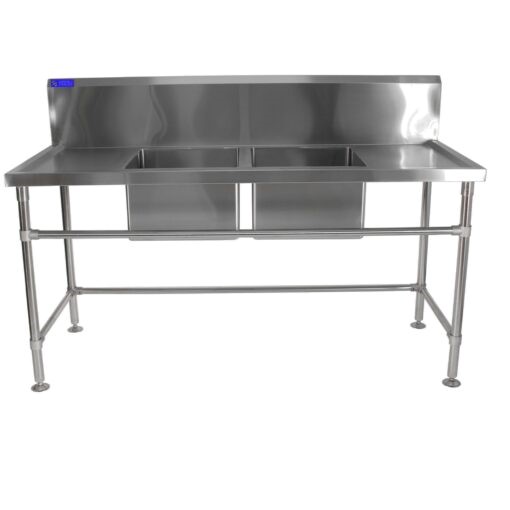What Kind of Stainless Steel Sink Doesn’t Scratch?

Choosing the right stainless steel sink can be a challenging task, especially when durability and scratch resistance are top concerns. This guide explores the types of stainless steel sinks that are less likely to scratch, helping you maintain a pristine and functional kitchen.
Understanding Stainless Steel Sinks
Stainless steel sinks are popular for their durability, rust resistance, and sleek appearance. However, even the highest quality stainless steel can develop scratches over time, particularly in new installations. For businesses like restaurants or cafes, ensuring longevity and easy maintenance of stainless steel fixtures such as Cafe Solutions commercial sinks becomes crucial in maintaining a professional kitchen environment.
Types of Stainless Steel
Stainless steel sinks vary in their composition and characteristics, which influence their scratch resistance.
- Gauge: The gauge measures the thickness of the steel. Lower gauge numbers indicate thicker, more robust steel that is less prone to scratching. For instance, a 16-gauge sink is thicker and more resistant to scratches than a 22-gauge sink.
- Finish: The finish affects both the look and scratch resistance of the sink. Shiny, mirror-like finishes tend to show scratches more easily, while satin or brushed finishes can better conceal minor scratches, keeping the sink looking new longer.
- Insulation: While primarily for noise reduction, quality insulation also enhances the sink’s overall durability and indirectly contributes to scratch resistance.
Factors Affecting Durability
Several factors influence how well a stainless steel sink can resist scratches:
- Material Quality: High-quality stainless steel, such as 304-grade steel, is more resistant to scratches and corrosion due to its higher chromium and nickel content.
- Maintenance: Proper care, including regular cleaning with non-abrasive materials, significantly extends the life and appearance of the sink. Using soft cloths and mild cleaners helps prevent scratches.
- Usage: The frequency and nature of use affect scratch formation. Heavy use with hard utensils or heavy pots increases the likelihood of scratches. Using rubber mats and avoiding direct contact with sharp instruments can help reduce wear.
- Installation: Proper installation with adequate support reduces strain on the sink, helping to prevent scratches and other damage over time.
Choosing a Scratch-Resistant Stainless Steel Sink
When selecting a stainless steel sink that resists scratches, consider the gauge and finish:
- Gauges and Scratch Resistance: Lower gauge sinks (e.g., 16-gauge) are thicker and more resistant to scratches than higher gauge sinks (e.g., 18-gauge). Thicker materials also offer better durability and reduce the risk of dents.
- Finish Types and Their Impact: Satin and brushed finishes are excellent at hiding small scratches and water spots. These finishes provide both aesthetic and practical benefits, ensuring the sink stays looking new for longer.
Recommendations for Scratch-Resistant Sinks
To ensure longevity and maintain aesthetic appeal, consider the following tips and products for scratch-resistant stainless steel sinks:
- Use Sink Protectors: Implementing sink protectors adds an extra layer of defense against scratches from pots and utensils.
- Avoid Harsh Cleaners: Use mild detergents and a soft sponge instead of abrasive cleaners and pads, which can damage the sink’s finish.
- Clean Regularly: Rinse and wipe the sink after each use to prevent residue buildup, which can cause scratching.
- Dry Thoroughly: Drying the sink after washing prevents water spots, which can make small scratches more visible.
Conclusion
Choosing the right stainless steel sink is essential for maintaining a clean and functional kitchen. Opt for a lower gauge sink for increased thickness and durability, and select finishes like satin or brushed for added scratch resistance. Employing care tips such as using sink protectors, mild cleaners, and thorough drying can help preserve the scratch-resistant quality of your stainless steel sink, ensuring it remains in excellent condition for years to come.
Frequently Asked Questions
What factors affect the durability of a stainless steel sink?
The gauge thickness, finishes, and installation methods all influence a sink’s durability. Lower gauge sinks are thicker and more durable, while finishes like satin and brushed help conceal scratches and water spots.
Why is it important to choose a scratch-resistant stainless steel sink?
Scratch-resistant sinks maintain their visual appeal and are easier to clean and maintain over time, contributing to a cleaner and more functional kitchen.
How can I prevent scratches on my stainless steel sink?
Prevent scratches by using sink protectors and avoiding harsh cleaners. Regularly clean the sink with mild detergents and a soft sponge, and thoroughly dry it after each use to prevent water spots.
What care tips are suggested for maintaining a scratch-resistant stainless steel sink?
Use mild detergents, employ sink protectors, clean regularly with non-abrasive sponges, and dry the sink thoroughly after each use to maintain its scratch-resistant quality.






